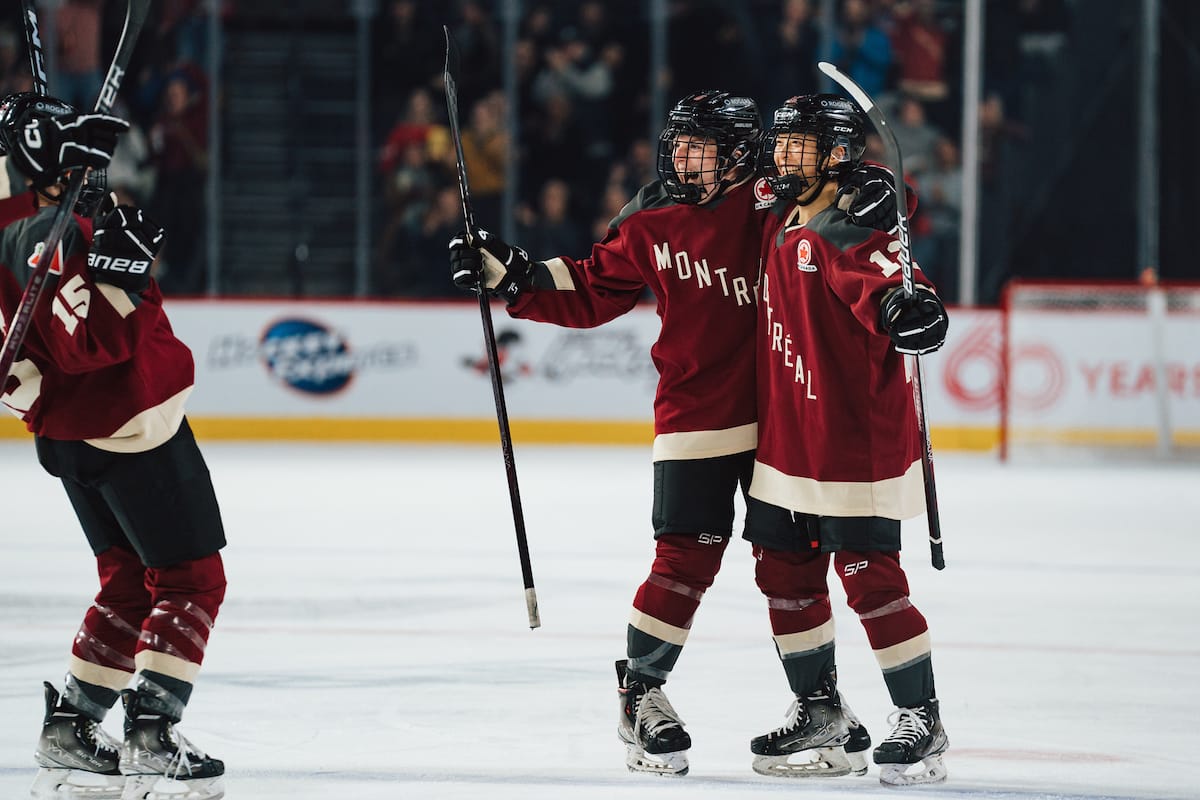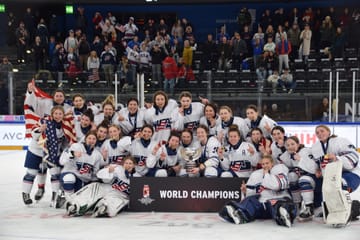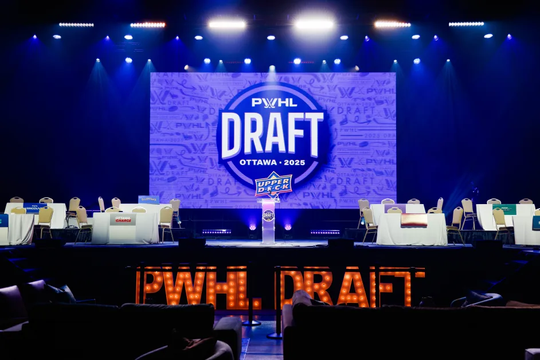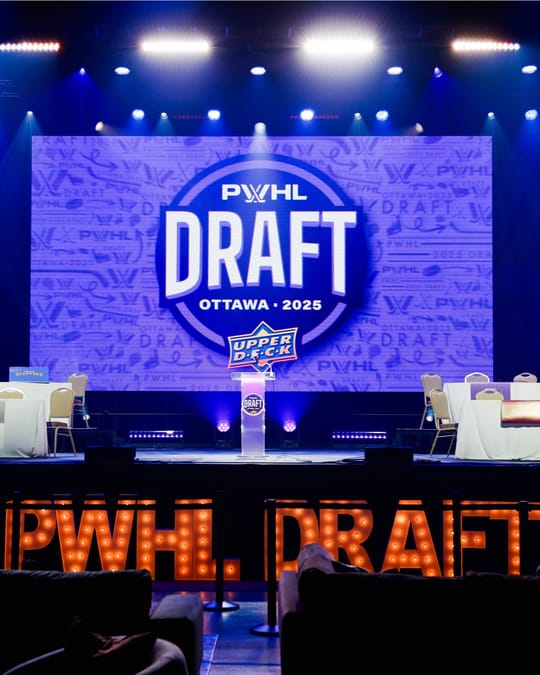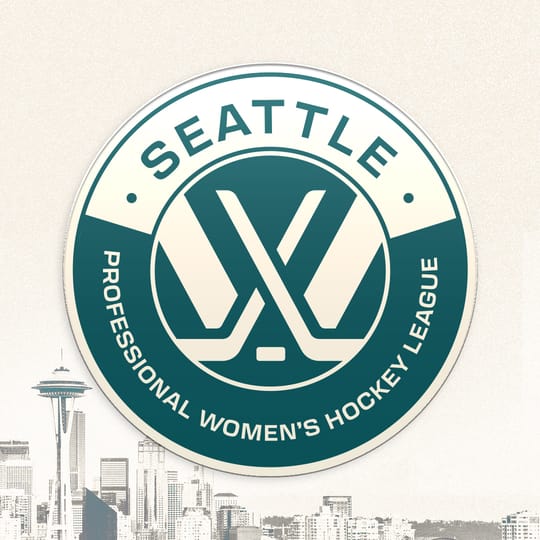Montreal's first game at Place Bell in Laval became just the third home victory in this inaugural PWHL season, and the first on Canadian soil, in front of over 6,000 fans.
What happened?
The first period had a sort of powder keg feel to it, looking back. The teams competed hard for the puck along the boards and generated a ton of turnovers, and while both got some chances, Montreal seemed to ultimately have the better end of play. Despite some back-and-forth, they got two quick goals towards the end of the first period to go up 2-0.
First, Gabrielle David worked the puck deep and threw it into the crease. It bounced instead to Jillian Dempsey, who worked it behind the net, and then threw it back out to David, who had driven towards the net in the interim. It was a sort of 360-degree give-and-go, made possible by New York chasing behind their own net and failing to pick up David.
Off of the next faceoff, Montreal stormed the New York zone again, and Leah Lum was able to shoot through a sea of players in the slot to beat Abbey Levy, who didn't see a thing.
In the second period, things shifted to another gear and got... spicy. Abby Roque and Marie-Philip Poulin took matching minors after a faceoff when Poulin cross-checked her counterpart up high and Roque chased her and hit her back. Tereza Vanišová got a penalty for interference on the goaltender for driving to the net on Levy and seemingly losing her balance on the way in. New York was finally able to capitalize on the ensuing power play, as Shelton dished to Jaime Bourbonnais at the center point, who shot through traffic to beat Desbiens.
The physicality increased significantly throughout the course of the game, and the officials finally sent a bit of a message by penalizing Kati Tabin for an open-ice takedown of Jessie Eldridge who had just received a pass in the slot, but New York could not capitalize on their late power play opportunity.
They wasted little time tying it up in the third period, though, as New York was able to take advantage of an early icing call against Montreal. Alex Carpenter won the offensive zone faceoff back to Eldridge, whose quick shot beat Desbiens. New York poured it on to try to get the regulation win throughout the rest of the third, mounting 17 shots on Desbiens by the official count, but it was Montreal that was able to convert late. Maureen Murphy forechecked hard in the New York zone to regain possession and threw the puck towards the net, where Poulin was standing on guard (again, unpicked by New York's defense) to poke it in. The goal would stand as the game-winner, though there would be additional penalties for roughing and elbowing and interference on the goaltender before it was all over.
Three up, three down
↑ Getting it back – For the second time in as many home games, Montreal got a 2-0 lead and gave it up. This time, they forced a regulation win instead of allowing overtime. It marks their second regulation win of the season. The pace and physicality here was, let's say, intense for a regular season game, and Montreal was able to find the extra edge they needed to put it away and get 3 points in the standings.
↓ The body checking rule??? – If this rule were enforced as written, the pace and tenor of this game probably would have been a bit different, and I'm honestly kind of still talking through with myself how I feel about it. I know that players want a higher level of contact in the game, but it seems like a lot of body checking that should be penalized per the rulebook is going un-called.
Per the PWHL rulebook (Rule 52), body checking is not legal if a play is not being made to gain possession of the puck, including hitting someone into the boards to eliminate them from the play. While some penalties were assessed for open ice contact as "roughing", a lot of board checks were allowed which seemed like they technically should not have been. We know the women's game can be tough and physical and we also don't remotely expect PWHL reffing to be as strict on contact as, say, the IIHF, but it seems like the body checking rule and how it's being called need to be evaluated.
Maybe that means they need to change the rule. Maybe that means officials need to start calling those hip checks along the boards. We're far enough along into the season that the non-calls are looking more like a trend than a fluke.
↑ Montreal's top line – The configuration of Vanišová-Poulin-Murphy seemed to really find its potential at Place Bell on Tuesday. Murphy's forechecking and vision plus Vanišová's nose for the net and Poulin's all-around finishing ability? It's a game-breaking set of players with skills that can complement each other so well, and they were the difference in Montreal's win.
↓ Missing sticks – PWHL New York did not receive their own sticks until the second period, after they were apparently delayed at the airport. New York players looked much more comfortable on the ice after the equipment change. They were provided with sticks by local companies, but it's an unfortunate disadvantage for New York. Clearly the league didn't want to delay this game over the sticks, so they'll need to figure out how to prevent this from happening in the future. That's a situation you don't want players to have to deal with on the road.
↑ Power plays, in general – The winningest teams in the PWHL are doing it without much power play success. Minnesota does not have a single power play goal on the season, and they sit atop the league. Montreal, ranked #2 after their regulation win in this game, has only scored 1 PPG in 16 opportunities, and they were 0 for 4 on Tuesday.
↓ Handshakes – Per Habs EOTP's Jared Book, PWHL New York was told to not do handshakes on the ice after the game, though Montreal didn't get the same memo. Handshakes after the game have often been a feature in women's hockey at every level. You always see them after every game at IIHF tournaments. In the NHL, handshakes normally only take place after the final game of a playoff series.
Howie Draper said the no handshake was a directive from the league. Montreal must not have gotten that memo. https://t.co/970Go1yHo8
— Jared Book (@jaredbook) January 17, 2024
Intentionally doing away with them in the PWHL makes a certain amount of sense. I like handshakes but I also understand why it doesn't make sense from a practical or product perspective to have them after every single regular season game. They take up time on the broadcast and delay teams getting back to their locker rooms to change, fulfill media obligations, and leave the rink. The league may also want to send a message to both fans and players that these teams are competing against each other and we aren't all coming out to the rink just "for the love of the game" anymore.
A good compromise might be to have handshakes after the first matchup between teams in a season, and then only after the conclusion of playoff series. That would engender camaraderie and provide something of the tradition to new players who might not have been around in the before times – and give that subtle degree of narrative tension that sports fans get excited about. It would also expedite the postgame process at the rink.
VP's Player of the Game
Jessie Eldridge – The New York forward is such a key part of their offense. She draws penalties and uses her body well in open ice, and she never gives up on a puck – she tried to feed a teammate in the slot from her knees on more than one occasion in this contest. Her goal tied the game for her team at a crucial moment and it's the sort of thing you come to expect out of Eldridge.
- Game replay link (YouTube)
- Game data
- Grateful for confirmation of team stats via the Giants in the Crease Patreon.
(Photo: Arianne Bergeron/PWHL)
